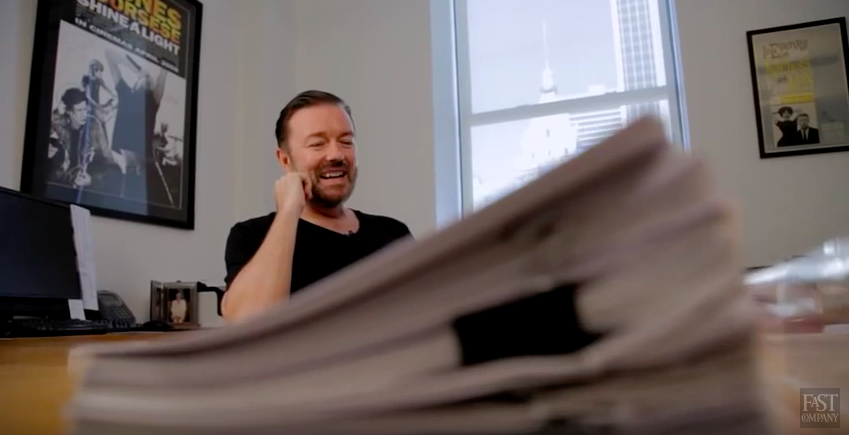Reading Time: About 1 minute
As part of its ongoing “Creation Stories” series, FastCompany posted this interview with Ricky Gervais. Gervais is perhaps one of the best comedic writers in the business today, known to most audiences for his work on The Office which he built into a brilliant multinational franchise on the insight that no matter where you go in the world, “we’ve got a little bit of David Brent in all of us.”
Gervais recounts one of the most important lessons he learned as a writer and storyteller. It happened when he was about 13. No matter how hard he tried to excel at creative writing in school, his work failed to impress his instructor.>I always thought my stories were the best. They were more exciting. And whenever I wrote a story and handed it in I always got it back: “Too melodramatic. Write about what you know.” And this was frustrating because I was thinking, “it’s either good or it isn’t.” And I thought my stories were so … who wouldn’t like a story called Jesik about a maverick cop who didn’t play by the rules? Are you mad? … And all the other kids are getting B’s and A’s.
Then Gervais describes his plan to get back at his teacher—to write a story that was very real and lacking any sense of melodrama. In fact, Gervais conceived of this story as a kind of prank. He would write something that was just so boring, in his view. That story altered his understanding of what it takes to engage an audience.
Being honest is what counts. Trying to make the ordinary the extraordinary is so much better than starting with the extraordinary.
The piece reminds me of my own frustrations as a young writer. I think many of us can relate to the advice, “write about what you know.” I remember arguing with a professor in college. “Shakespeare was never stranded on an island,” I said. And the clever professor shot back, “but he most certainly felt isolated and perhaps a little mad at times. That’s why The Tempest works.”
It doesn’t matter whether we’re writing a report for our job or a new novel, the key to good storytelling is relating. When I was younger, the phrase I hated almost as much as “write what you know” was “all you need is life experience.” There’s no quicker way to enrage an ambitious kid with a pen in hand then tell them their work will get better with age. But as an older man I know the advice is accurate. The more we live, the more we can relate our stories to what we’ve experienced in the real world. Or as Gervais puts it, “It’s your job to make an audience as excited and fascinated about a subject as you are. And, real life does that.”

